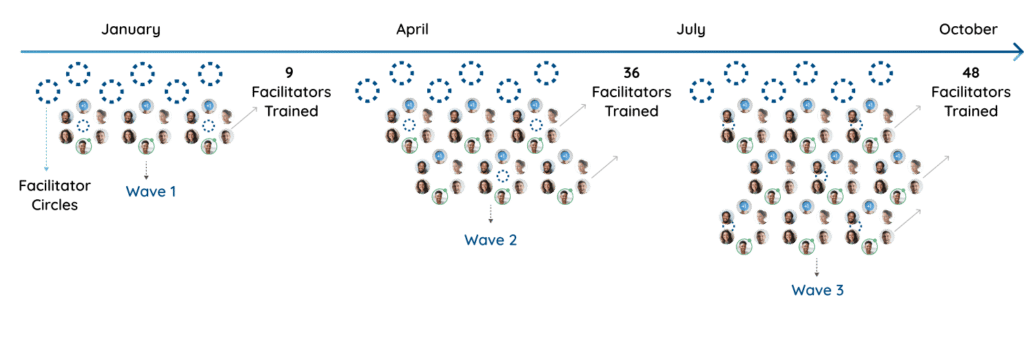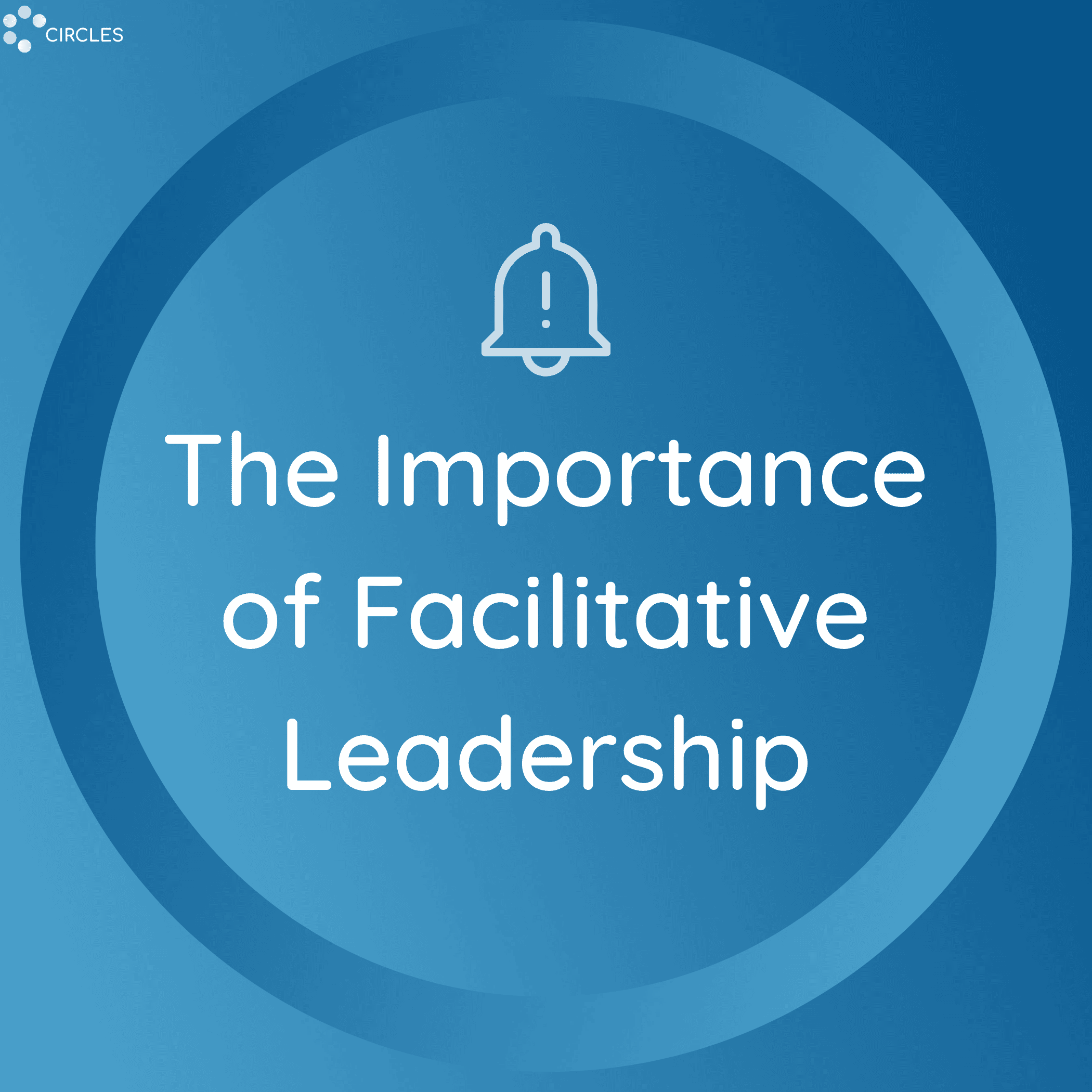As flat as our organizations may become, leadership happens in functional workplaces. The problem is that we’ve all experienced a mixed bag of leadership at work: for every great encounter, we’ve survived not-so-great moments with colleagues (and, if we look honestly in the mirror, each of us can probably identify times we ourselves didn’t lead well). Agile, skilled leaders are hard to find, and becoming one might be hardest of all, especially now in our turbulent world.
Here’s what’s giving us hope at Circles: rising leaders emerging out of circle sessions with a new set of soft skills. These leaders are born by osmosis. As participants, they watched someone facilitate a conversation and caught the vision that a thoughtfully guided small group of 6-8 people produces connection, growth, and transformation. Inspired, they went on to guide circles for others, modeling facilitative leadership for the next round of participants.

We saw this multiplication happening with an enterprise client recently: what started as nine trained facilitators in one curated program multiplied into 36 leaders in the next, culminating with a growing pool of 48. As one of the original participants shared: “I enjoyed my Circles experience and the platform so much that I wanted to facilitate a circle. The proudest moment for me was to see two team members who I had invited into circles decide they want to facilitate circles going forward.”
These champions are developing facilitative leadership, a set of skills that not only transforms company culture more than any lone executive could, but has the potential to extend beyond the office into personal relationships, volunteer settings and more.
“I enjoyed my circles experience and the platform so much that I wanted to facilitate a circle. The proudest moment for me was to see two team members who I had invited into circles decide they want to facilitate circles going forward.”
From top-Down to Grassroots: Redefining Leadership
Like we observed in our enterprise customer, modern-day, effective leadership starts grassroots and spreads organically. It doesn’t flow top-down. It can’t be learned in a webinar or by reading an instruction manual.
Gone are the days of the following leadership traits:
● Pride
● The desire to teach
● The desire to argue, persuade, impose a certain point of view
● An interest in answers rather than questions
● A disposition towards judgmentalism, or pre-judgement
By contrast, facilitative leadership translates into the wisdom to bite one’s tongue or sit in awkward silence. Facilitators develop the attentiveness to take the pulse of a room and respond accordingly. Some qualities of effective facilitation include:
● Humility
● Warmth
● Genuine curiosity, both about ideas and human beings
● Comfort with ambiguity and uncertainty
● Willingness to hold space for discomfort or hard topics
● Openness
● An inclination to ask the challenging questions about what we might need to do
Differently
Who wouldn’t want to work with (and emulate) a leader like that?
Facilitative Leadership: Caught, not Taught
Facilitating comes more naturally to some than others, but like anything, it can be learned. I experienced this firsthand: when asked, I was hesitant to lead a circle of peers internally. I’ve read and written enough about circles to understand that facilitation is all about energy, timing and flow, and I know myself too well: when it comes to energy, I’m more of a reflector than someone bringing big energy into a group.
But I’ve participated in many internal facilitated circles. I’ve watched different types of leaders guide Circles conversations. Reading and writing about circles didn’t teach me about facilitative leadership: being facilitated did.
Because I knew I would grow and understand our product better if I stepped up and tried, I said yes. And what I discovered along the way is what our own customers have learned as they step from participant to facilitator: I’m improving in facilitative leadership. What helps is the support of the Circles platform, features and agenda which support a session’s energy, timing and flow.
More than that: I’ve noticed changes in how I interact with others in my everyday life. With my family and friends, I’m slowing down and becoming more intentional about energy, timing and flow–leaving space for others, reading the room, seeking to understand and ask the right question at the right time.
Why it Matters
As the world continues changing quickly, organizations must follow suit. Facilitative leaders can help employees navigate change together. The Systems Thinker recognizes how strategic it is for today’s evolving organizations to develop and maintain a crew of facilitative leaders. “Facilitation, while long associated with individuals leading workshops, planning meetings, or other group processes, actually encompasses a broad mix of consulting and coaching skills that are too critical to be relegated to the domain of a select few.” Implementing Circles programs into any organization and equipping a few champions sets the stage for a growing pool of facilitative leaders.
Circles help people connect and grow. The platform design and agenda content promote social learning and peer connection across companies big and small. But it’s the human element that creates the magic: people bringing their whole selves into the circles fuels transformation. Our data reveals that the shining stars are the facilitators rising up within organizations, employees who begin as participants, witness the power of a facilitated circle, then step up and guide their colleagues through everything from tough transitions to global crises.
So we’re letting our customers define modern, effective leadership, by watching the effect facilitated circles have on their company culture–and the type of leaders they produce. Some choose to go on and engage our booster training, to more formally step into a facilitator role; from there, they can even receive the new Circles Leader badge.
Are you interested in building a pool of facilitative leaders in your own org? Contact us today!
